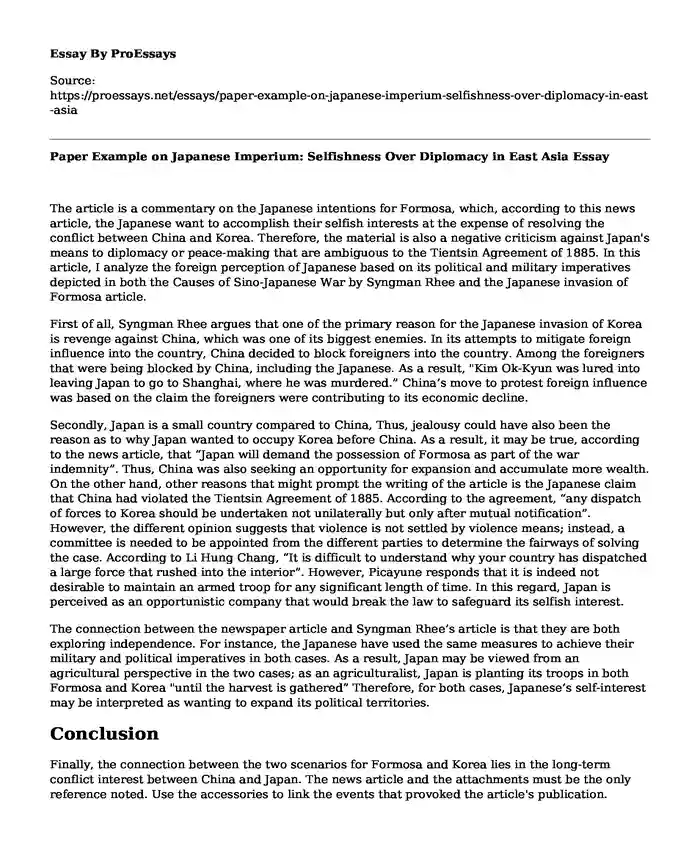The article is a commentary on the Japanese intentions for Formosa, which, according to this news article, the Japanese want to accomplish their selfish interests at the expense of resolving the conflict between China and Korea. Therefore, the material is also a negative criticism against Japan's means to diplomacy or peace-making that are ambiguous to the Tientsin Agreement of 1885. In this article, I analyze the foreign perception of Japanese based on its political and military imperatives depicted in both the Causes of Sino-Japanese War by Syngman Rhee and the Japanese invasion of Formosa article.
First of all, Syngman Rhee argues that one of the primary reason for the Japanese invasion of Korea is revenge against China, which was one of its biggest enemies. In its attempts to mitigate foreign influence into the country, China decided to block foreigners into the country. Among the foreigners that were being blocked by China, including the Japanese. As a result, "Kim Ok-Kyun was lured into leaving Japan to go to Shanghai, where he was murdered.” China’s move to protest foreign influence was based on the claim the foreigners were contributing to its economic decline.
Secondly, Japan is a small country compared to China, Thus, jealousy could have also been the reason as to why Japan wanted to occupy Korea before China. As a result, it may be true, according to the news article, that “Japan will demand the possession of Formosa as part of the war indemnity”. Thus, China was also seeking an opportunity for expansion and accumulate more wealth. On the other hand, other reasons that might prompt the writing of the article is the Japanese claim that China had violated the Tientsin Agreement of 1885. According to the agreement, “any dispatch of forces to Korea should be undertaken not unilaterally but only after mutual notification”. However, the different opinion suggests that violence is not settled by violence means; instead, a committee is needed to be appointed from the different parties to determine the fairways of solving the case. According to Li Hung Chang, “It is difficult to understand why your country has dispatched a large force that rushed into the interior”. However, Picayune responds that it is indeed not desirable to maintain an armed troop for any significant length of time. In this regard, Japan is perceived as an opportunistic company that would break the law to safeguard its selfish interest.
The connection between the newspaper article and Syngman Rhee’s article is that they are both exploring independence. For instance, the Japanese have used the same measures to achieve their military and political imperatives in both cases. As a result, Japan may be viewed from an agricultural perspective in the two cases; as an agriculturalist, Japan is planting its troops in both Formosa and Korea "until the harvest is gathered” Therefore, for both cases, Japanese’s self-interest may be interpreted as wanting to expand its political territories.
Conclusion
Finally, the connection between the two scenarios for Formosa and Korea lies in the long-term conflict interest between China and Japan. The news article and the attachments must be the only reference noted. Use the accessories to link the events that provoked the article's publication. Therefore, even though China violated the treaties made, Japan had also violated the Tientsin treaty of 1885. Thus, “it is a foolish dream of killing off all the superfluous working to create a monopoly of the few that remains" in this case, Japanese intention to create monopoly against Formosa by murdering people may be perceived as a foolish dream because other foreign countries might protest against them.
Bibliography
Rhee, Syngman. The Spirit of Independence: A Primer for Korean Modernization and Democratic Reform. University of Hawaii Press, 2001.
The Capture of Formosa Probable." Daily Picayune, 16 Mar. 1895, p. 4. Nineteenth Century U.S. Newspapers.
https://link.gale.com/apps/doc/GT3014503717/NCNP?u=txshracd2550&sid=NCNP&xid= effb8e62. Accessed 19 June 2020
Cite this page
Paper Example on Japanese Imperium: Selfishness Over Diplomacy in East Asia. (2023, Sep 10). Retrieved from https://proessays.net/essays/paper-example-on-japanese-imperium-selfishness-over-diplomacy-in-east-asia
If you are the original author of this essay and no longer wish to have it published on the ProEssays website, please click below to request its removal:
- Areas That Blair-Brown Governments Continue Reverse Conservative Social Policies
- The Trip to Africa Essay Example
- Essay Sample on Economic Growth of the United Kingdom
- Essay Sample on Managing Equality and Diversity at Work
- Human Freedom: Enhancing and Limiting Factors - Essay Sample
- Essay on Constitutional Governments: A Written Constitution Basis
- Democracy: A Measure of Modern Nations' Success - Essay Sample







